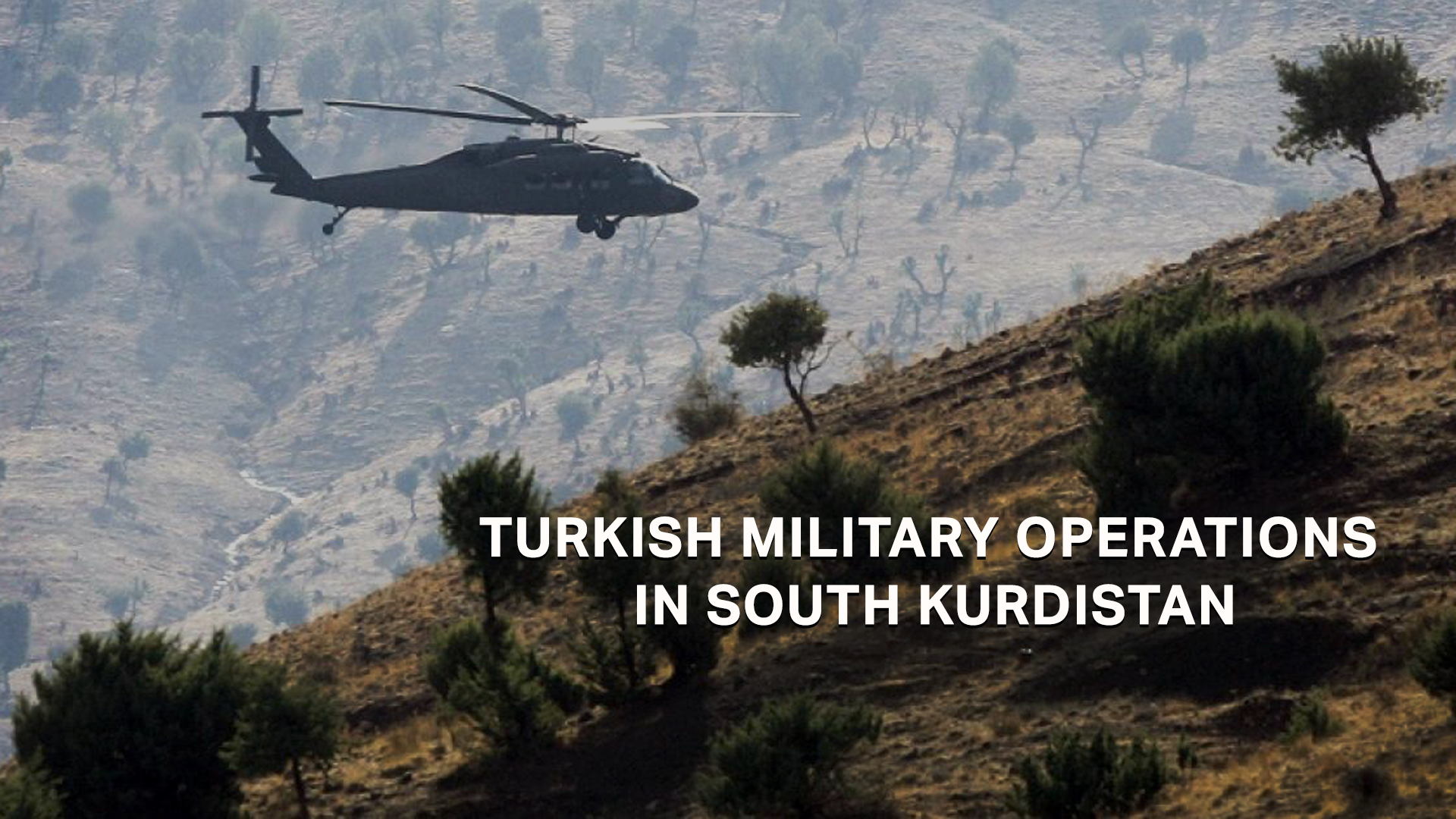Turkish military operations in South Kurdistan

The Turkish military moves in South Kurdistan, Rojava and Syria’s north in general, and the establishment of military bases must be linked to historical documents especially the Misak-ı Millî that Erdogan waved on every occasion to legitimize his aggressive policies in the region under the pretext of fighting the Kurdistan Workers’ Party (PKK). The Iraqi silence regarding the Turkish military operations within the Iraqi territory cannot be explained other than linking it to economic and even personal interests, such as obtaining the support of the Turkmen for the upcoming elections or receiving financial support to strengthen his position further. Al-Kadhimi affirmed his country’s rejection of any threat targeting the neighboring Turkey from Iraqi lands. He noted to the necessity of activating the agreements approved during his last visit to Ankara such as the agreement to cancel the double tax treaties with Iraq, and the continuation of development projects, especially in the energy sector including the oil pipeline between Kirkuk and Ceyhan, in addition to the importance of Ankara’s commitment to implement its investment pledge made at the Kuwait conference to support Iraq in 2018, where Turkey pledged to provide more than $5 billion to contribute to the reconstruction of Iraq due to the repercussions of the war on ISIS. Al-Kadhimi did not mention the Turkish violations of Iraqi sovereignty, filling lawsuits before the Security Council and the United Nations, or demanding Iraqi rights regarding the waters of the Euphrates River, as through his silence, he is trying to strengthen his influence internally and externally and at the expense of Iraqi sovereignty in order to ensure his continuation in the presidency of the Iraqi government. Even if statements are made by some Iraqi officials, they only remained just statements for internal consumption.
The visit of the Turkish Minister of Defense, Hulusi Akar to the Kani Masi base in South Kurdistan (northern Iraq), without getting the approval of the Iraqi government, is a stark evidence of Turkey’s intentions to annex south Kurdistan region to the Turkish territories according to the internationally unrecognized Misak-ı Millî especially with the approaching of 2023, the year in which Erdogan is trying to delude the world with the expiration of the Treaty of Lausanne in 1923 and the start of a new phase based on the Misak-ı Millî for building a new Turkey.
Erdogan’s denunciation of the peace agreement with the PKK in 2015 came after realizing that the continuation of such an agreement would harm him, his party and his colonial policy, where Erdogan cannot extend his control internally and externally except by violating this agreement and the return of the armed conflict. At the same time, he is fully aware of the impossibility of ending the PKK after the passage of about five decades of the war between the two parties and the heavy losses suffered by the Turkish army in south Kurdistan and in the Turkish interior. Under the slogan of fighting the PKK, Turkey has consolidated its military presence in the region, as many Turkish officials have clarified the real goals behind the continuous Turkish attacks on the territories of south Kurdistan, with the aim of further penetration there and the establishment of several permanent military bases, especially in the area of Matina, according to what Turkish Minister of Interior, Suleiman Soylu stressed on the strategic importance of the Matina area in Dohuk Governorate in Iraqi Kurdistan saying: “Just as we did in Syria, we will establish bases and control the region.” Since 2019, Turkey has carried out several military operations, including Operation Claw, Claw 2, Claw 3, Eagle Claw, Tiger Claw, Eagle Claw 2, Lightning and Thunderbolt. All of which failed to end the PKK, but on the other hand, it managed, in agreement with the Kurdistan Region of Iraq, to build several military bases in the region, which numbered about 37 military sites in south Kurdistan.
With this, Turkish military operations have become a threat not only to the countries of the region, but also to NATO. The Royal Institution of Great Britain, which specializes in security and military issues, confirmed that Turkey, along with Iran, together pose a threat to the security of the Middle East, warning against Turkish military interventions in south Kurdistan by undermining the missions of NATO in the region. The Institution, quoting prominent security academics, confirmed that Turkey undermines the strategic importance of NATO in the Middle East, as Turkish military campaigns make it difficult for NATO to achieve stability in Iraq. The Institution expressed its fear that Turkish military interventions, which aim, to a large extent, to divert attention from the failing domestic economy, to a larger conflict in the region that negatively affects the interests of NATO, in addition to the report of the US Commission on International Religious Freedom, which recommended exerting pressure on Turkey and dealing with it to provide a timetable for its withdrawal from all the lands it occupies as a result of cross-border military operations in northeastern Syria.
From here, Erdogan’s colonial ambitions have become a real threat to the interests of the US in the Middle East and the influence of its policy in its conflict with China and Russia. The US will not be able to confront Chinese economic expansion, Russian military expansion unless the Biden administration puts an end to the Turkish policy that serves Russia and China, the Russian S-400 deal, the growing trade relations with China that supports the Chinese project of “One Belt, One Road” and its occupation of the countries of the region that the US considers its allies. The crises that faced the region and the lack of any solution were mainly caused by Turkish intervention such as the Syrian crisis, the instability of Iraq, the Libyan crisis, its support for the Muslim Brotherhood to destabilize Egypt, the eastern Mediterranean crisis and the Nagorno-Karabakh crisis.




